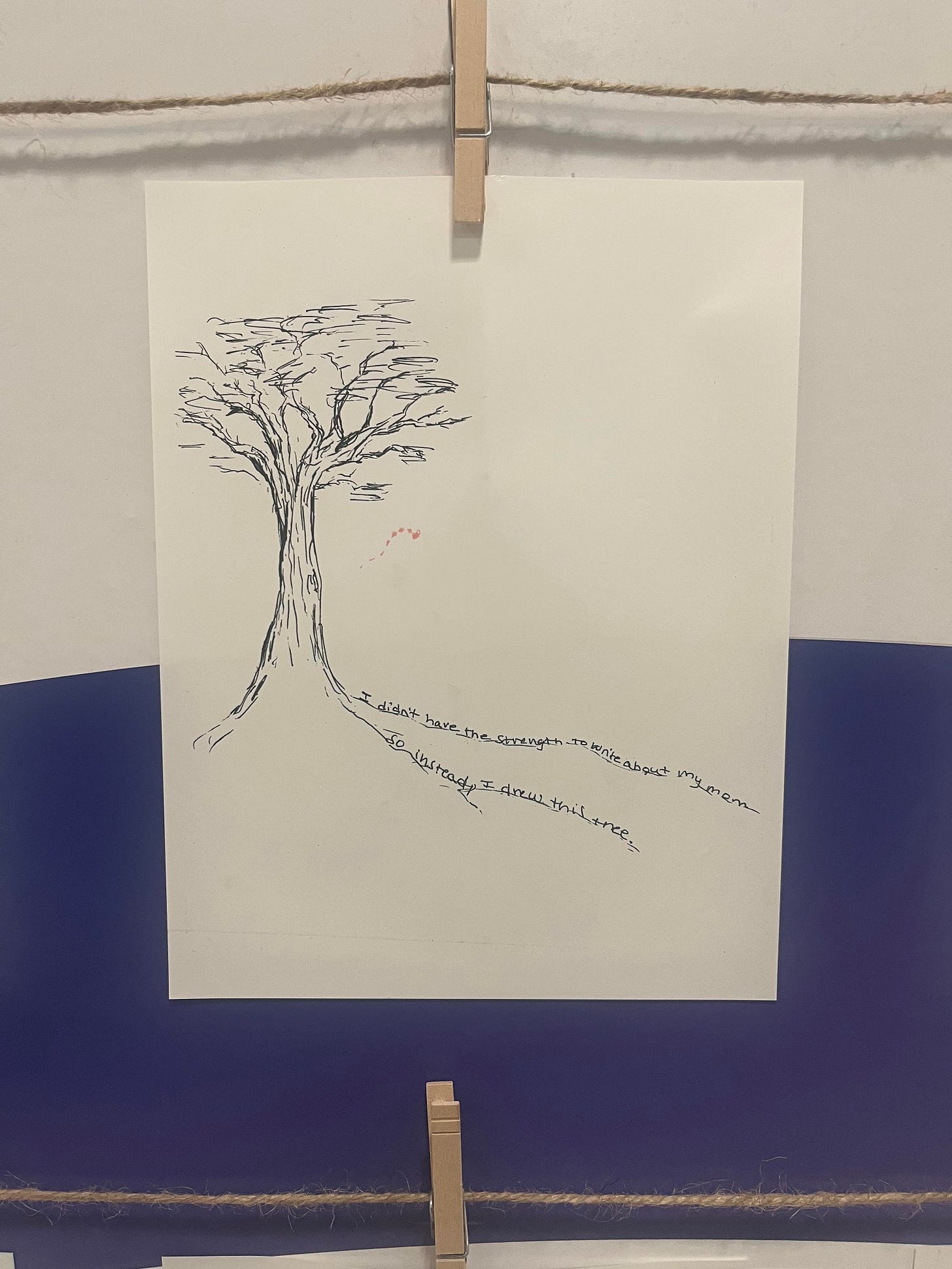Experience by omission
A tree in JFK airport and the importance of what we forget
“The secret of boring people,” Chekhov said, “lies in telling them everything”.
“Have you been through JFK terminal eight recently,” my friend texted me last week. “There’s a quasi-art exhibition going on asking people ‘what is it like being you?’ and then people hang up their answers”.
One response caught my friend’s eye. It was a sketch of a tree in black ballpoint pen ink. The tree filled the left-hand side and two roots stretched across the white page. On the top root it said: “I didn’t have the strength to write about my mom”. And on the bottom: “So instead I drew this tree”.
It wasn’t the “best” response to the prompt. If it was an answer to an examination question it would have needed a lot more information. The sketch doesn’t give any insight into what it’s like being this person. Yes, they have strong feelings for their Mom, but everyone has strong feelings for their Mom. And why the tree? It certainly wasn’t an optimal answer. But it caught my friend’s attention (whose Mom died when he was young) and it caught my attention (who just talked to their Mom a few hours ago).
I don’t know what happened to this person’s Mom. The first thought is that they loved her, and she died and writing about her will remind them she is no longer here. But there are other possibilities. It could be that their Mom is still alive but ill, or she is alive but was abusive, or has just fled the family leaving three kids. Or maybe she is alive and healthy and lovely, and just the thought that one day she will be gone is too much. So instead, a tree.
Garbage memories
I asked the artificial intelligence chatbot Claude “what it is like being you” and it said: “when you ask me something, there's an immediate engagement with multiple possible interpretations and responses, a narrowing down to what seems most relevant and helpful, and then the construction of my reply”.
In other words, it gives the average response. Given all the information in the world, and all the responses to similar questions, Claude gives the answer that is “most appropriate” for the greatest number of people.
The short story Funes the Memorious (1942) by Argentinian writer Jorge Luis Borges describes a Uruguayan boy named Funes that falls from his horse. It paralyses him physically and most importantly gives him perfect memory. Every sense and experience he ever has is recorded: “he remembered the shapes of the clouds in the south at dawn on the 30th April 1882, and he could compare them in his recollection with the marbled grain in the design of a leather-bound book which he had only seen once, and with the lines in the spray which an oar raised in the Rio Negro on the eve of the battle of Quebracho”.
For some this initially might seem to be a gift, especially those that crave success in examinations, but for Funes it’s crippling. “I have more memories in myself alone than all men have had since the world was a world,” he complains to a friend while he lies in a darkened room. “My memory, sir, is like a garbage disposal”.
Someone’s personality is not just created by every sensory input they have ever received. It is a constant filtering process. With every experience being pushed through the emotions we feel at the time. Memories only have value because of what they tell us about ourselves. Without this they are “garbage”. All the bits that should have been thrown away but haven’t been.
Why these ones?
What makes humans unique from one another is not just what they know, but what they have forgotten. Almost everyone can remember the moment they fell in love. Where it was, what they talked about and their first kiss. Emotions influence memory, and when someone feels strongly the brain filters their experiences. The same night as the first kiss, they would have taken a taxi, chatted to the bouncer on the door and tipped a now faceless bartender. They might have even bumped into an old friend from high school, but they will never know or remember.
When the person decided to draw that tree, it was the “most appropriate” response for them. It wasn’t the amalgamation of every response ever given to that question and it wasn’t trying to satisfy as many people as possible. They may have read some of the other pieces of paper that were hung up before, like a student glancing at someone else's exam. But unlike a school exam, while everyone else may have an answer to 'what is it like being you,' no one else's answers are helpful.
My friend denies the tree caught his attention because of the “specific Mom sentiment”. Instead, he says it was because it was such a human way to respond. He is thinking of printing it out to put on his wall. He admits there is “maybe something subconsciously appealing to him there” but doesn’t want people to think he is doing it because of his Mom, “which he isn’t”. I don’t know why he likes it and neither does he.
Similarly, why the person in JFK chose to sketch the tree we can’t know. Maybe there was a white willow outside the hospice? Or their mother planted a Japanese dogwood on their third birthday? Or they just like trees? But for them to make this choice required a specific feeling and without this discernment an aesthetic decision can never be made.
Regardless, whatever random set of circumstances that conspired, I am glad they made this choice. It isn’t the “most appropriate” response, and it might not even resonate with most people, but it caught my friend’s attention and it inspired me to write this.


